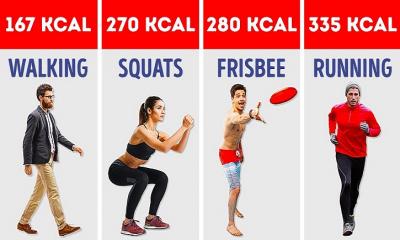
Does Hypnosis for Weight Loss Work? Here’s What Experts Say
- Women`s Corner
- September 16, 2022
If you’ve been struggling to lose weight, it only makes sense to want to explore your options beyond trying out a new diet. And, with that, you may have come across information on using hypnosis for weight loss. Sure, hypnosis isn’t exactly something more people have experience with. You’ve probably seen things on TV where hypnosis makes people bark like a dog, talk like a zombie, or do a bunch of embarrassing stuff, at the mercy of the hypnotist.
But hypnosis for weight loss isn’t like that. And many people have sought out hypnotists to help them adjust their relationship to food and fitness. Many of those have found great success. It begs the question: When this technique is facilitated by a medical professional, like a psychologist or psychiatrist, does it look like what we see on stage?
Answer: Nah. “People often confound hypnotherapy with stage hypnosis for entertainment, and in reality, the two have very little to do with one another,” says Samantha Gaies, Ph.D., a licensed clinical psychologist at NY Health Hypnosis and Integrative Therapy, who works with individuals who want to lose weight or heal eating disorders.
Here's what clinical hypnosis is really about and how it can help you change your lifestyle for the better.
How does clinical hypnosis work, anyway?
When someone is trying to make a major change in their life, like overcoming obesity, there can be a lot to think about: What foods you should be eating, how you should exercise, and where you’ll feel safe enough to exercise, for example. Certain judgements or fears might get in the way of forming long-term habits that could transform a person's health.
Read More: BBQ Pulled Chicken Sandwiches
“I usually describe hypnosis to my patients by likening their current minds to a hamster wheel,“ says Dr. Gaies. “There's nonstop movement or thinking, yet that thinking doesn't typically get them very far when it comes to making impactful changes.”
So, what a clinical hypnotherapist aims to do is guide their patients into a relaxed stateyes, called a trance using a number of techniques that vary from deep breathing to visualization.
Contrary to popular belief, a trance won’t have you trudging around like The Walking Dead. In fact, most of us enter a trance when we are daydreaming or doing a routine task. In these moments, our “hamster brain” stops spinning and we become less focused on our to-do list or daily stressors. Once in that trance state, Dr. Gaies walks her patients through series of exercises to help them get in tune with their desires to change.
“Hypnosis is effective because it allows people the opportunity to slow down the analytical and intellectual chatter in their minds to more easily access and focus on what is deeper down and most important to them,” says Dr. Gaies.
In other words, hypnosis can help people tap into their subconscious brain, which largely influences our habits. “The subconscious brain is where a lot of our behaviors and motivations are,” says Tony Chon, M.D., a certified hypnotherapist and general internal physician at the Mayo Clinic in Rochester, MN. “In hypnosis, you're really trying to motivate the brain to make changes.”
Hypnosis is “used to allow modification of behavior by suggestion,” says Amanda Holtzer, M.S., R.D., a dietitian at Culina Health. “Weight loss requires behavior change,” she continues. “For some, hypnosis may very well function as that first step in behavior change. We have to make a mental and emotional decision to take different actions that will induce weight loss, right? Well, for some, hypnosis may help with that decision making process.”
Read More: Chicken, Spinach, and Artichoke Pasta
Does hypnosis help people lose weight right away?
Hypnosis is not a magic bullet, so don’t walk into a hypnotherapy session and think you’ll start shedding pounds at the snap of a finger. As Dr. Gaies says, hypnosis is a tool that can help break patterns of thinking that prevents someone from developing healthier routines. It’s those lifestyle shifts that will lead to weight loss over time.
Most people who approach hypnotherapy are already preparing themselves to make lifestyle adjustments, such as altering their food choices or buying a gym membership, says Dr. Chon.
“Oftentimes people who are struggling with weight loss or eating disorders tend to feel stuck in a cycle of overindulging or being sedentary, which is then followed by self-blame and shame,” says Dr. Gaies. “This type of pattern is usually fueled by other emotions or experiences, so we tend to explore those aspects of their life within the context of a session. Diet and exercise then tend to come more easily to those who engage in hypnosis since they have shifted their underlying thoughts and feelings to more helpful patterns of thinking.”
But if someone is entirely depending on hypnosis to achieve their weight loss goal, “that might be a little more difficult,” Dr. Chon says (putting it nicely). To see lasting results, Dr. Gaies recommends multiple sessions. “As you learn how to go more deeply down, you'll feel more in touch with your wants and needs, which creates a more heightened sense of autonomy and independence.”
Hypnosis alone will only get you so far: “Hypnosis itself will not induce weight loss,” Holtzer says. “Weight loss is a scientific equation based on caloric intake vs caloric burn.” Meaning, you could absolutely try hypnosis to lose weight but, at the end of the day, the thing that will actually help you lose weight is burning more calories than you take in.
But, Holtzer says, “the journey of trying to lose weight is not just physical it takes a great deal of mental and emotional strength as well.” And, for many people, the mental and emotional part of weight loss is the hardest, she says.
Hypnosis is also “something that might help with that emotional battle that often comes along with the journey of trying to lose weight,” Holtzer says, adding that “an attitude of confidence and optimism” can be “extremely helpful” in your weight loss journey. “We want to have positive thoughts: ‘I can do this. I am strong enough to do this. I am worth it. I deserve to feel happy and strong in my body,’” she says. “If we are experiencing opposing, negative thoughts, it’s going to make the process all the more difficult. If you find it hard to embrace those positive thoughts and emotions, hypnosis might help.”
Read More: Cheesy Chicken Enchiladas
Who is hypnosis for?
While there are studies that claim some people are less “suggestible”, or more resistant to hypnosis, Dr. Gaies says that everyone has the potential to benefit from this type of therapy.
“As long as someone is open to the idea that a deeper state of relaxation is possible and they are willing to let go, hypnosis is a fantastic tool,” she says. “One fact that often interests people is that individuals who are more creative and score higher on intelligence tests can more readily reach a hypnotic state.” Hypnotherapy can be helpful not only for people who want to those weight, but also for those who want to quit smoking, ease chronic pain, treat mental illness, or overcome phobias.
What do dietitians think of using hypnosis for weight loss?
Dietitians say hypnosis might be helpful for weight loss if it’s just one of many tools in your toolkit. “Research suggests that it might be more effective when associated with psychological therapies, diet, and physical activity,” says Keri Gans, M.S., R.D., author of The Small Change Diet. “Also, overall the scientific evidence on hypnosis solely and weight loss at this point is inconclusive.”
It’s also tough to make a sweeping statement to say whether or not hypnosis for weight loss will work for you, Holtzer says. Meaning, everyone is different. “This is something that requires a case-by-case analysis to assess its effectiveness when it comes to weight loss,” she says.
But, again, Holtzer stresses that “it is absolutely best to pair [hypnosis] with a change in your eating plan. Hypnosis itself will not induce weight loss. It is the action that follows the hypnosis that will induce weight loss.” Ultimately, she says, “pairing with a healthy eating plan and an exercise regimen tailored to your lifestyle is the most effective strategy for weight loss.”
Read More: Peking Style Chicken
Are there any negative side effects?
For most people, there are no negative side effects. If anything, hypnotherapy might not work and the most negative thing you'll experience is disappointment. However, some doctors warn that hypnosis can be dangerous if you’re suffering from a serious psychiatric condition. If you are suffering from psychosis, an organic psychiatric condition, or an antisocial personality disorder, it’s best to consult with a psychiatrist before trying hypnotherapy.
What does the research say?
Multiple studies show that hypnosis has helped people achieve moderate weight loss. In 1996, researchers at Oxford found that patients who received stress reduction hypnotherapy lost more weight than a control group that only received dietary advice. In 2014, scientists in Italy studied the effects of hypnobehavioral and hypnoenergetic therapy on women suffering from obesity. Both treatments improved their weight, BMI, and eating behaviors.
While you can find many success stories in literature, remember that most of the individuals who made strides incorporated other weight loss strategies like consuming less calories.
If you’re considering hypnotherapy: Do your research. “You have to be careful in terms of who you are working with,” says Dr. Chon. “Know in your state exactly how hypnotherapy is regulated because it can get kind of murky.” And in booking someone, aim for a licensed psychologist or psychiatrist. Without trust and expertise, hypnosis could be a waste of your time, money and emotional investment.
This article is taken from https://www.prevention.com/








